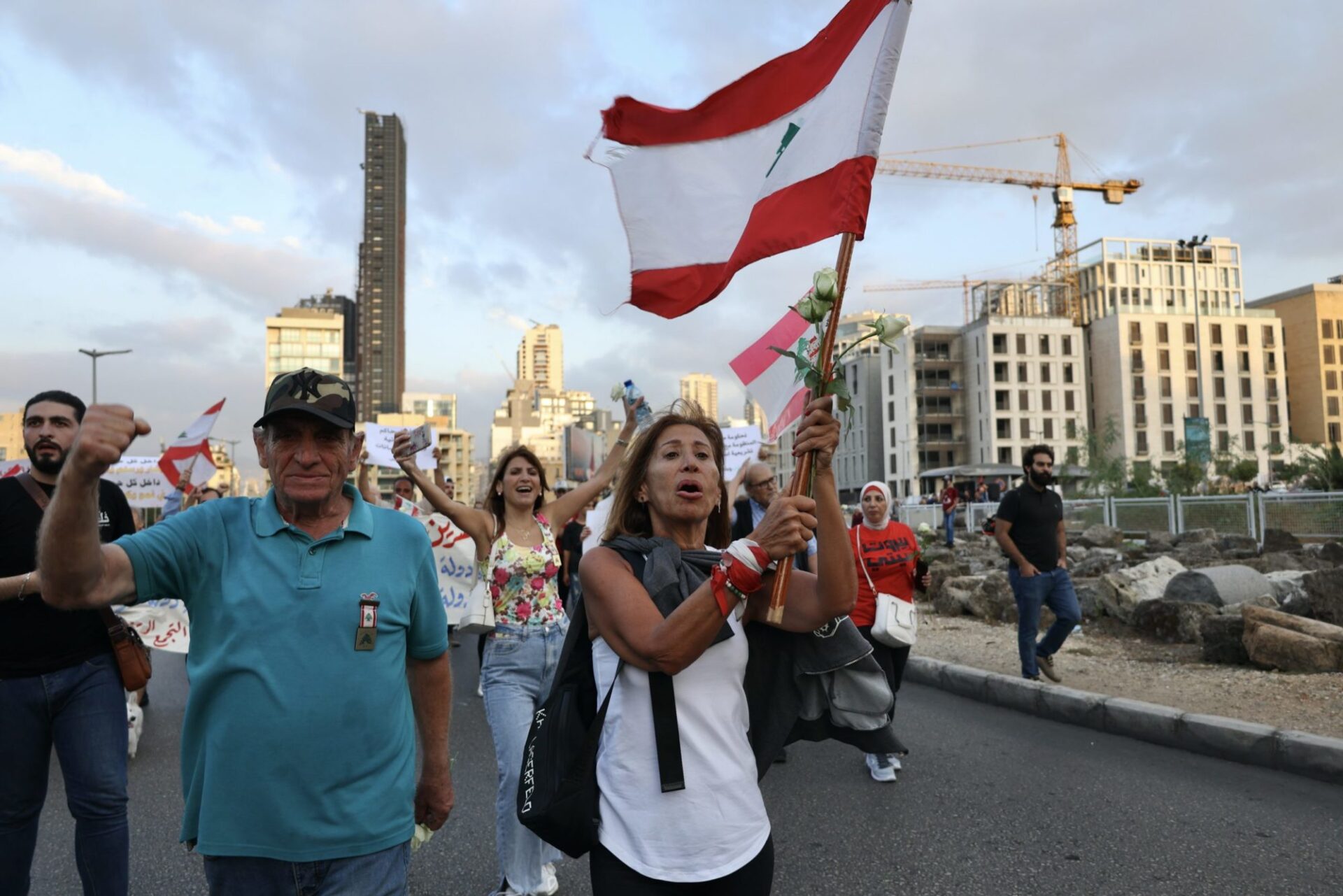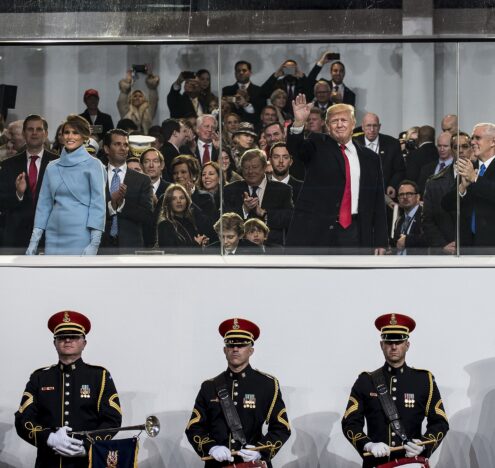Only in Lebanon would the public hail the organizer of a bank heist a national hero.
But three years since the eruption of a nationwide anti-establishment movement that has brought at best modest political achievements amid an acute state collapse, Sally Hafez’s brazen action on Sept. 14, 2022 captured the deep extent of frustration and hopelessness millions of Lebanese feel. Sally, an interior designer, used a toy gun to hold up a bank in Beirut — to access her own money.
“I consider it part of the pressure against the banks because I want the banks to give the money back to their people,” Sally told me in October, referring to informal capital control measures implemented by commercial banks in late 2019 that have severely restricted depositors’ access to their savings.
Once described as the Switzerland of the Middle East, today Lebanon finds itself on its knees, crushed by the weight of an economic crisis that the World Bank deemed one of the worst in modern history. Most of the population now lives in poverty, struggling to afford meals and basic necessities amid triple-digit inflation. The UN estimates that around 2 million people in the country need assistance with food security and health care, alarming figures amid a cholera outbreak in the country’s impoverished north and Russia’s withdrawal from a crucial grain export deal. Exacerbating the situation is an ongoing lack of electricity, which has forced many people to rely on private generators that are becoming increasingly unaffordable.
All the while, political gridlock hampers reforms needed to secure international aid and lift Lebanon out of the abyss.
THE ROAD TO COLLAPSE
Three years ago, Lebanon looked quite different.
At that time, lights still shined in the streets of Beirut, illuminating the coastal Mediterranean capital. Hope radiated in the chants of protestors demanding sweeping political reform and an end to a ruling establishment deemed grossly corrupt. “All of them means all of them!” was the rallying cry that, however briefly, brought Lebanese from across sectarian lines together under one banner in October 2019.
The Revolution, as the protest movement came to be called, mirrored the Arab Spring uprising that engulfed the region several years prior. But the hope that initially radiated across Lebanon would not last. As protests took steam, commercial banks closed and implemented informal measures curtailing depositors’ access to their savings. Seemingly all of the sudden, an economic meltdown years in the making began to implode.
As the economy crumbled, political elites hung on to power while squabbling and impeding reforms desperately needed to avert further disaster. The situation worsened as the government defaulted on its sovereign debt, the COVID-19 pandemic spread across the globe, and a massive explosion at Beirut’s port in 2020 destroyed large swathes of the capital city.
DESPERATE TIMES, DESPERATE MEASURES
What made Sally a hero was that her heist wasn’t a typical bank robbery. She didn’t demand funds belonging to the bank or other depositors. Rather, she forcefully acquired her own money in order to finance cancer treatment for her sister.
The control measures imposed by commercial banks limit the amount of money depositors can withdraw. They also set the withdrawal of foreign currencies, such as the US dollar, at outdated exchange rates that result in huge losses at the local currency’s present street rate.
A day before the heist, Sally’s younger sister Nancy told her that she was dying and that Sally would need to raise her 3-year-old daughter, Sila.
“You will not die,” Sally responded, promising to get the money.
And she did.
With a toy gun that she took from her nephew, Sally stormed the Beirut branch of BLOM Bank with several accomplices. Footage of her brandishing the toy and shouting orders at panicked and dazed employees spread across social media. After making out with $14,000, a pursuit that borders on the comical ensued. Police called her asking where she was. She responded that she was on her way to the airport and posted on Facebook that she was traveling to Istanbul. The diversion worked, buying her enough time to conduct an interview with a local television station before police realized they had been tricked and showed up at her home. Prior to answering the door, she threw on a disguise and pretended to be pregnant, close to giving birth.
“I played with them,” she laughed. “Even I didn’t recognize myself.”
Police let her pass, wishing her well as she made her way out of the building.
“We hope you have a boy!” someone shouted.
Outside, she jumped in the car of a relative, who took her east to Lebanon’s Beqaa Valley, where she remained in hiding for 20 days.
Sally’s bank heist wasn’t the first, but it seemed to spark a wave of others in the following days, including by an anti-establishment parliamentarian who needed money for surgery.
In response, commercial banks closed their doors indefinitely as they blamed the government for not passing formal capital control measures to address the economic crisis.
THE ROAD AHEAD
While Lebanon’s economic crisis unraveled in 2019, the collapse was in fact a death foretold. What amounted to a national ponzi scheme financed an unsustainable economic model rampant with corruption and mismanagement. By the end of 2019, Lebanon’s public debt was 179% of its GDP. The combined losses of commercial banks and the central bank total more than an estimated $70 billion, a number three times greater than Lebanon’s $18 billion GDP in 2021. Critics accuse powerful elites of refusing to take responsibility for the collapse and owning up to losses.
“They could have stopped all of this,” said Sumru Altug, chair of the economics department at the American University of Beirut. “The government did nothing.”
As Lebanon enters into a political crisis with parliament unable to elect a new president, the economic collapse appears poised to worsen.
Since 2018, Lebanon’s GDP has contracted by 40%, inflation stands at just under 162%, and the value of the local currency has fallen more than 90%.
In an attempt to avert further collapse and mitigate the impact of bleak conditions, foreign powers have stepped in.
In the 2022 fiscal year, the United States earmarked $240 million in aid for Lebanon, which in addition to an estimated 4 million Lebanese is also home to more than 2 million Syrian and just under half a million Palestinian refugees. Iran — the Shia regional powerhouse and close ally of Lebanon’s most powerful party Hezbollah — has also provided aid, particularly desperately needed fuel. To lift the country out of the crisis, the International Monetary Fund (IMF) has identified a number of economic reforms, which if implemented will unlock $3 billion in aid. But progress toward reaching the benchmarks has been slow and controversial.
In mid-October 2022, parliament approved a reformed banking secrecy law, but it isn’t clear if the amended law meets IMF standards. An earlier version approved by parliament in July 2022 “contained some positive steps, (but) it fell short of the changes needed to bring it in line with best international practice,” Ernesto Ramirez Rigo, the head of the IMF mission to Lebanon, said in late September 2022. His comments came a few days before parliament approved a new budget that the IMF has yet to comment on.
“It lacks any recovery or rescue plan,” Mouafac Harb, a Lebanese political analyst, said about the budget. “It’s just an accounting exercise to show that the cabinet knows what it’s doing.”
Failure to address the economic crisis has highlighted political polarization and the stiff limitations that anti-establishment parliamentarians elected in May have faced as they attempt to take on entrenched elites blamed for the collapse.
“They are causing a lot of headaches for the speaker and the establishment because they want to do things according to the book, not the way it used to be done in the past,” Harb said about the anti-establishment MPs. “[But] they have failed [to implement reform] because the sectarian sentiments and the political system is so deeply rooted that it makes it almost impossible to bring about a major change in the political situation in Lebanon.”
As long as establishment parties and figures retain the majority of power, many expect the crisis to continue.
“Thirty years of corruption will lead to what we have today,” said anti-establishment MP Najat Saliba.
But while Naliba acknowledges the challenges and difficulties that she and her 12 other colleagues have faced, she refuses to back down.
“Change does not happen overnight,” she said. “It does not come after one protest on the street or even one year of protests on the streets. Change is a long process. And in the same way that corruption has been built for over 30 years, change is going to take some time before we can really see it happening.”
“IDEAS DON’T DIE”
When Sally turned herself in to the authorities after nearly three weeks of hiding, she appeared before a judge who seemed sympathetic to her case. Another judge joked that if she got his money from the bank, he would give her half of it.
There was no electricity in the courtroom, not that it mattered much. The court session lasted a mere 10 minutes.
The judge released her on a 1 million lira bail, roughly $25 at the current street rate. In a short time, that fee — which would have been about $670 before the economic crisis — may devalue even further, to be worth even less.
As Lebanon enters into a political crisis with parliament unable to elect a new president, the economic collapse appears poised to worsen.
With no end to the country’s collapse in sight, many people are choosing to emigrate. Between 2017 and 2021, some 216,000 people — out of a population of roughly 6 million — emigrated from Lebanon, according to the Beirut-based research and consultancy firm Information International. Those leaving have found jobs, enrolled in universities, or established businesses in countries near and far from Lebanon.
Sea departures have also increased exponentially since 2020. As of September 2022, some 4,000 people have attempted to leave Lebanon by boat this year. Most departed for Italy, with a smaller number aiming to reach Cyprus. Some attempts have proven fatal. In September, a boat carrying upwards of 170 migrants capsized, leaving at least 97 dead.
But even as many opt to leave, Sally plans to stay.
“I won’t be like those people that emigrated, because they left the country for the thieves and the corrupted,” she said.
On Oct. 17, 2022, she and a few hundred other people converged on Beirut’s iconic Martyrs’ Square to commemorate the three-year anniversary of the revolution. The turnout was a fraction of what it had been when it began, reflecting the hopelessness and disillusionment that many now feel about the uprising.
“Personally, I will continue the way of the revolution,” Sally had said during our interview a few days prior. Since the uprising began, she has been tased, shot with rubber bullets, and hospitalized. But none of it has stopped her.
“The revolution is a spiritual thing,” she said. “It’s not going to happen only on the streets. It’s going to continue and will always stay next to the people that are in need.”
“It’s an idea, and ideas don’t die,” she continued.
Soon, Nancy will undergo surgery for her cancer using the funds her sister acquired. As for Sally, she still has several thousand dollars in her bank that she intends to get back. “If they don’t give it to me peacefully, I will go forcefully.”




















